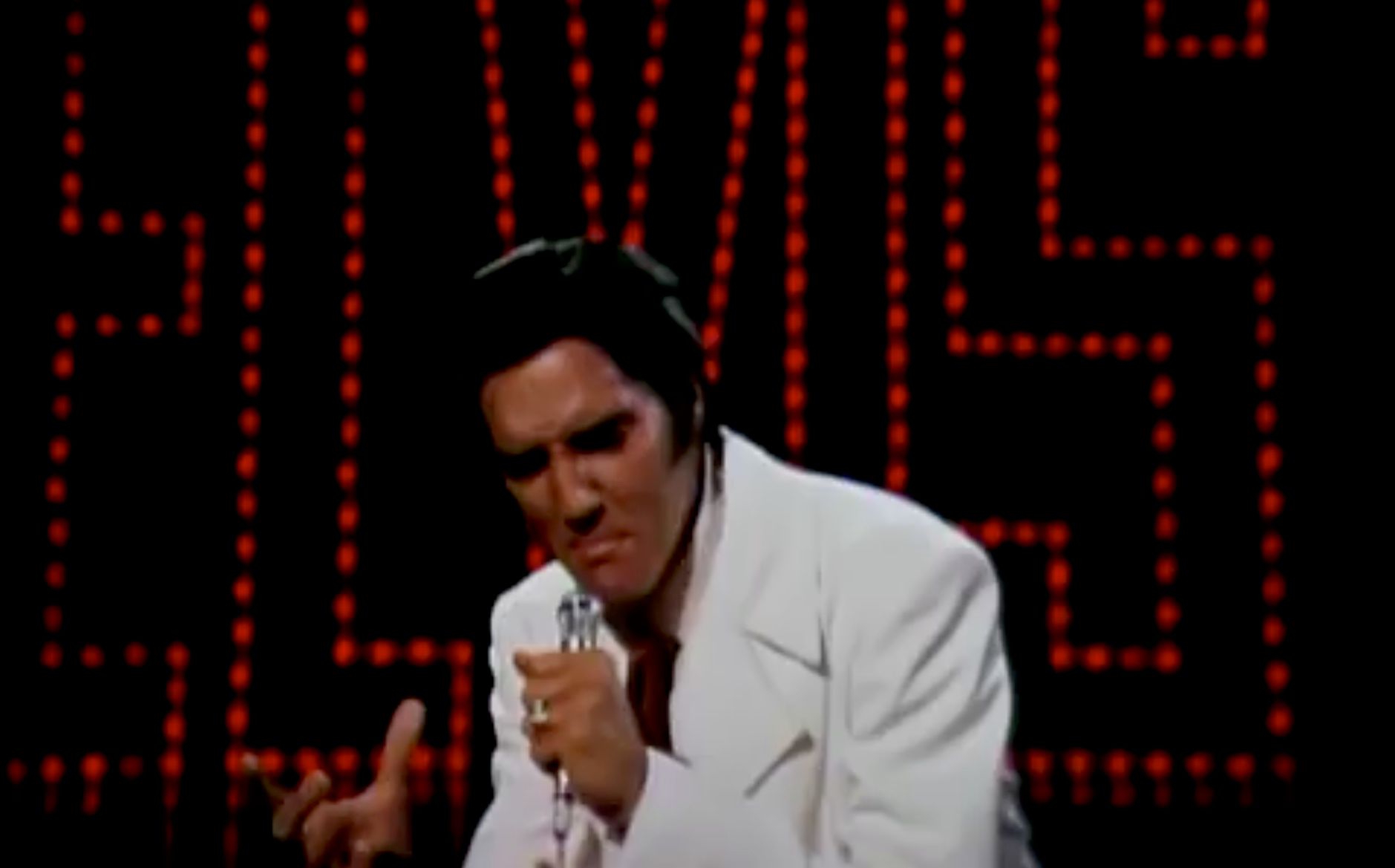‘If I Can Dream’
The movie Elvis (2022) highlighted this soulful protest song performance, made shortly after the MLK and RFK assassinations. It is stunning.

In my younger years I was a big Elvis Presley fan. Not in the sense of knowing a ton of trivia, reading biographies, or even knowing all that much about the man. The internet was primitive, and I read mostly fiction.
I would listen to his music all the time, and took a lot from its energy and the larger than life, iconic and exaggerated Americana of his image. The dialled-to-twelve vocals that blasted and caressed in the same line. His ability to take it over the top and make it work.
I wore my hair in a big quiff for a few years, and listened to him more than any other artist.
This was before YouTube became a fount of All Things, so there was plenty I hadn’t seen or heard. Recently, Baz Luhrmann’s Elvis (2022) sent me looking up the Elvis 68 Comeback Special performance of ‘If I Can Dream’.
If I had seen it before, I never knew its context: an “Elvis protest song” oddity, written for him in the immediate wake of the assassinations of MLK and RFK, both of whom he considered personal friends.
The finale was, according to Luhrmann’s biopic, also a fuck you to “Colonel” Parker’s dictate that “Elvis does not make statements,” and must perform ‘I'll Be Home for Christmas’ to cap the Christmas special in a commercially pleasing way. The movie does a good job at portraying the parasitic and psychopathic traits of his manager.
The song was written by Walter Earl Brown, with the title alluding to MLK’s “I Have A Dream” speech. It was recorded two months after the assassination of Martin Luther King Jr., and just two weeks after that of Robert F. Kennedy. The video was directed by Steve Binder.
The performance mesmerised me. It was more interesting than the movie suggested. It’s clear why Luhrmann chose to use it as a centrepiece scene in the movie.
I watched the video maybe ten times, loud, trying to articulate what made it so singular. It played in my mind on a loop.
I can't remember seeing an artist summon and sonically express so many facets of their self, feeling, vulnerability, turmoil, strength, and hurt in this way. Janis Joplin comes close in a way that feels akin, but singing about heartbreak. This feels like a recording of a soul being transmitted in a grotesquely beautiful, angry, pleading, striving and hopeful explosion, with society in mind. It is over-the-top, but real, with deep soul.
It is an oddity. I have seen no other Elvis performance like it. Like a glimpse into an alternative version of him, where he leaned hard into soul and embraced social protest wholeheartedly.
'In The Ghetto' has strong social commentary, and there's maybe a handful of Elvis songs that could be thematically related, but they are basically different. This captures the moment. It contains a live and painful conflict.
A crescendo of love, hurt, and fury glows. It feels overwhelmingly honest and unfiltered. Moments of grief break through sharply. They smack you in the face and stun you. You need to see the performance to really hear it. Elvis’s innards are splattered all over the stage, while something hopeful tries to soar.
It is not sugar coated in any way. It is a desperate and beautiful call from a dream as it collapses. A vision of future, raging against death.
The staging of the video, with a dead black backdrop behind an enormous red neon “ELVIS” sign, is fucking perfect. The camera movement and editing, is fucking perfect. That he’s wearing a white suit, but seems to want to explode out of it and fly to another universe, is fucking perfect.
Visually it is outstanding. The production and direction help make it what it is.
It captures Elvis at a crossroads, like a reflection of his home country. The southern gentleman, the decadent and overindulgent, heroic embodiment of post-war US, and the angry young man who is a true dreamer, are all there, fighting.
Part of what gives it energy to stun, and a tragic undertone, is knowing that decadent Elvis won the battle — with the help of his inner demons, the trappings of fame and wealth, and the influence of “Colonel” Parker, his machinations and Las Vegas debts.
The soulful protest singer Elvis seen here dissolved into air, never to be seen again. The performance feels like a form of artistic suicide; maybe Elvis knew this was a path he wouldn’t be able, or wouldn’t be allowed, to continue on. So he put everything into it, leaving nothing behind.
Read with the context of the MLK and RFK assassinations, it feels like a protest against cold-blooded entities, and cultures, that aim to destroy dreams and dreamers. A plea not to let the ship go down, and let enemies of hope inflect the trajectory of civilisation in desolate directions. A call to arms against those who prefer to create nightmares, often to feel powerful, or to forcibly seize or maintain power.
By all means, watch Luhrmann’s movie (I thought it was good). No question, watch the performance. It's hard to only watch once.
James Lanternman writes movie reviews, essays, and moonlit thoughts. You can reach him at [email protected].
Previously… Pig (2021): A Movie Review
